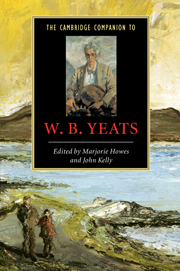Book contents
- Frontmatter
- 1 Introduction
- 2 Yeats and Romanticism
- 3 Yeats, Victorianism, and the 1890s
- 4 Yeats and Modernism
- 5 The later poetry
- 6 Yeats and the drama
- 7 Yeats and criticism
- 8 Yeats, folklore, and Irish legend
- 9 Yeats and the occult
- 10 Yeats and gender
- 11 Yeats and politics
- 12 Yeats and the postcolonial
- Bibliography
- Index
11 - Yeats and politics
Published online by Cambridge University Press: 28 January 2007
- Frontmatter
- 1 Introduction
- 2 Yeats and Romanticism
- 3 Yeats, Victorianism, and the 1890s
- 4 Yeats and Modernism
- 5 The later poetry
- 6 Yeats and the drama
- 7 Yeats and criticism
- 8 Yeats, folklore, and Irish legend
- 9 Yeats and the occult
- 10 Yeats and gender
- 11 Yeats and politics
- 12 Yeats and the postcolonial
- Bibliography
- Index
Summary
At the age of twenty, W. B. Yeats was a nationalist and Fenian sympathizer. Being Anglo-Irish, albeit marginally so, he eventually insisted upon the Irishness of the Anglo-Irish tradition and the responsibility of the Ascendancy to Irish culture. Occultist and mage, he was a mystical patriot, whose search for images involved magical visions as well as literary tropes (often they converged). After the fall of Charles Stewart Parnell in 1891, when he and others dreamed unrealistically of a radical transfer of nationalist energies from the political to cultural spheres, Yeats hoped to fill an apparent political vacuum with cultural work. He was dedicated to revamping an outmoded literary nationalism that had taken its colors from the propagandist simplicities of Thomas Davis and the writers of Young Ireland. Strategically essentialist about Irish and British cultures, he argued that all Irish writers should write about indigenous places and subjects: he himself rooted his imagination in the landscapes of Sligo and the West. By contrast, he was cosmopolitan in his influences, taking lessons from French Symbolists, Swedish mystics and German philosophers. He admired powerful men like Parnell, and argued, throughout his career, for bold leadership by the few over the many. He distrusted and despised the merely popular, the culture of the many, the language of newspapers, and political oratory. On the other hand, his love of ballads, early and late, seemed to be, but was not, a contradiction of this premise. His early nationalism was predicated on hatred of British utilitarianism and on the struggle with Young Ireland, but was also rooted in his marginal Anglo-Irish insecurities. Crucially, he stressed the equal importance of literature and politics. In this he was influenced by his father, but also by the old Fenian John O'Leary, who expressed reservations about Young Ireland propaganda, and said “there are things a man must not do to save a nation” (A 178).
- Type
- Chapter
- Information
- The Cambridge Companion to W. B. Yeats , pp. 185 - 205Publisher: Cambridge University PressPrint publication year: 2006
- 1
- Cited by

